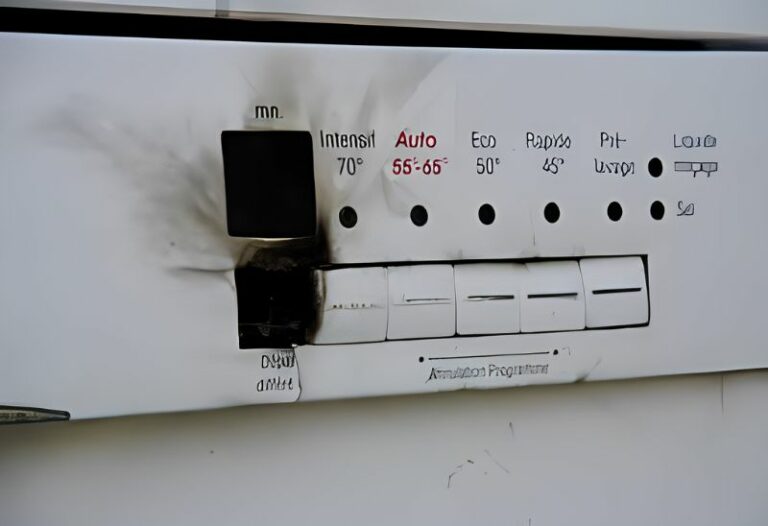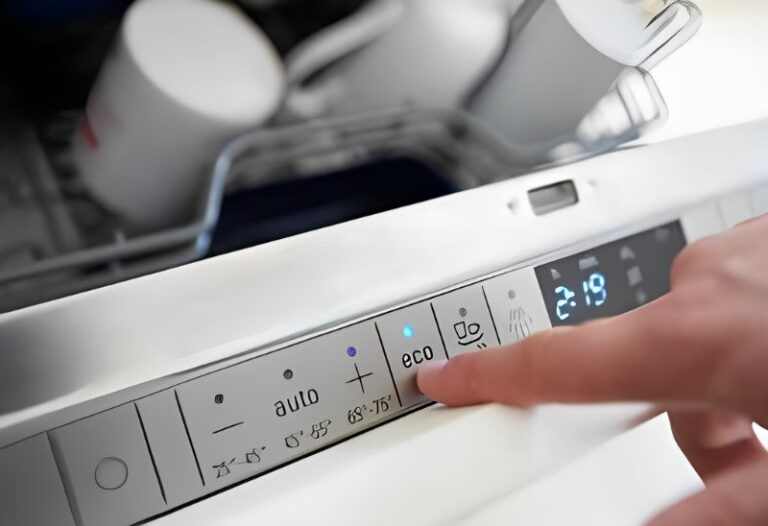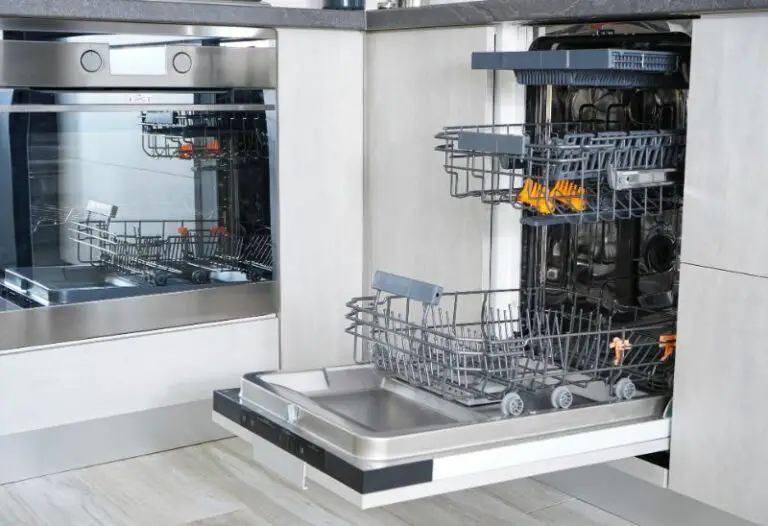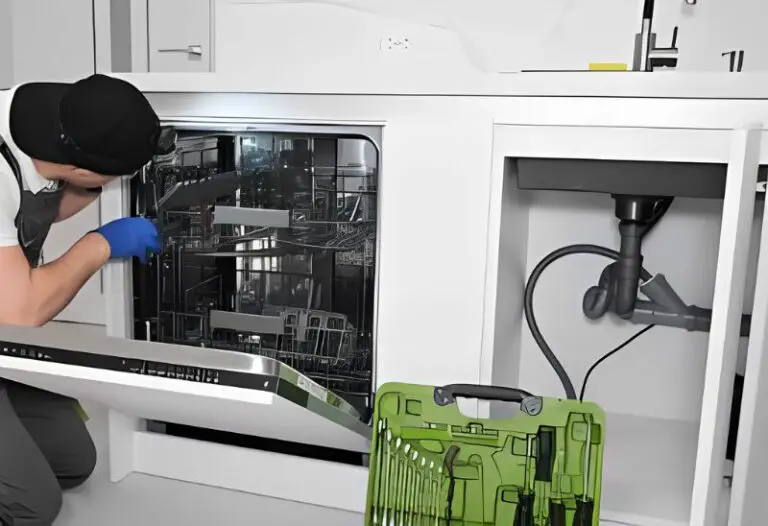A beeping dishwasher can interrupt the calm in any kitchen, signaling that something isn’t quite right. Whether it’s a rogue utensil blocking a spray arm or a door left ajar, those beeps are trying to tell you something.
Understanding these alerts allows you to quickly quell the noise and return to your routine. Our article guides you through common causes and solutions, ensuring your dishwasher’s beeps are heard but not for long.
Key Takeaways
- Dishwasher beeps are alerts to issues ranging from simple to complex.
- Troubleshooting involves checking for obstructions, ensuring closures, and resetting the machine.
- Regular maintenance can prevent future beeps and extend the life of your dishwasher.
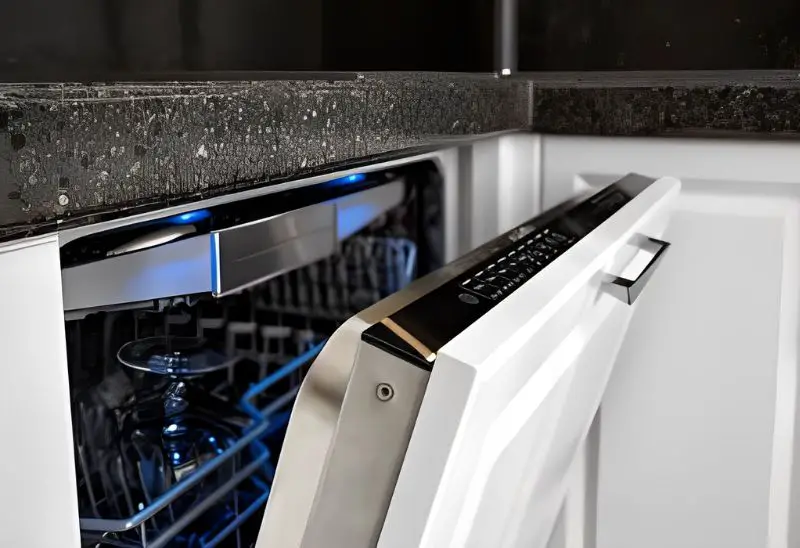
Decoding the Beep: Common Dishwasher Beeps and Their Meanings
Dishwashers communicate through beeping sounds to alert you to various issues. Understanding these beeps can help you troubleshoot problems quickly.
Continuous Beeping: This often indicates something is amiss with the door:
- Door Ajar: Your dishwasher wants you to shut the door properly. Make sure it clicks shut.
- Overloaded Dishwasher: Too many dishes can cause problems. Try removing some to see if that helps.
- Faulty Door Latch: If the door seems fine but the beeping persists, the latch might be the issue.
Intermittent Beeping: These beeps suggest a cycle hasn’t completed properly:
- Incomplete Cycle: The dishwasher may need your attention — check for a clogged drain or inspect the water pressure.
- High Water Level: Too much water inside might set off some beeps. Look for potential leaks or drain issues.
- Blocked Spray Arms: Food particles can block the arms, affecting the wash cycle and causing your dishwasher to beep.
For specific beep patterns, consult your dishwasher’s manual, but here are a few general pointers:
- 5 Beeps: Might mean there’s a problem with the draining system. Check the hose and pump.
- 7 Beeps: Could suggest a hiccup with the water inlet valve. Is the water flowing smoothly?
- 10 Beeps: This one is serious. It’s usually about the heating element. Best to reach out to a professional for this.
Beyond the Beep: Troubleshooting Additional Dishwasher Issues
When your dishwasher starts beeping, it can be a sign of other issues too. Let’s get to the bottom of things. Here’s a quick guide to help you figure out what’s happening and how to fix it.
Dishwasher Not Draining:
- Clogged Drain Hose: You’ll need to disconnect and clear out your dishwasher’s drain hose.
- Blocked Drain Pump: Time to check the pump filter and clean out any yucky stuff.
- Faulty Drain Pump: This is a bit tricky; you might need a tech-savvy adult to replace this part.
Dishwasher Not Filling with Water:
- Twisted Water Inlet Hose: Straighten that hose out or remove any blockages.
- Low Water Pressure: Double-check the household water supply or have a grown-up call the water company.
- Water Inlet Valve Woes: If it’s not working right, it’s time for professional help.
Dishwasher Not Cleaning Dishes:
- Clogged Spray Arms: These need a thorough cleaning, make sure the water can squirt out properly!
- Need More Detergent or Rinse Aid: Add more cleaning goodness or top off that rinse aid.
- Overcrowded Dishes: Give your dishes some personal space — make sure they are not crammed in like sardines.
Proactive Maintenance: Preventing Dishwasher Beeps and Problems
Keeping your dishwasher in tip-top shape can save you from the headache of unexpected beeps and malfunctions. Here’s how you can show some TLC to your valuable appliance.
Regular Cleaning:
- Filters and Spray Arms: Just like any other frequently used item, your dishwasher deserves a thorough cleaning. Make sure to clean the interior, filters, and spray arms regularly to prevent clogging.
- Monthly Cleansing Cycle: Running a monthly cycle with vinegar or a dedicated dishwasher cleaner can keep the insides fresh and running smoothly.
Proper Loading:
- Avoid Overloading: Your dishwasher’s not a fan of being crammed. Make sure to load it just right, following the manufacturer’s guidelines.
- Dish Placement: Pop those dishes in according to the make’s instructions, typically found in the user manual — this ensures optimal cleaning and avoids strain.
Detergent and Rinse Aid:
- Right Detergent: Stick to the detergent type that’s recommended for your model.
- Rinse Aid Refills: Keep an eye on the rinse aid dispenser and refill it as needed to prevent spots and enhance drying.
Maintenance Checks:
- Drain Hose and Filters: Every once in a while, check the drain hose and filters for any blockages that could cause issues.
- Inlet Valve and Water Pressure: Keep tabs on the water pressure and the inlet valve’s operation to ensure your dishwasher’s getting the water flow it needs.
Additional Resources and Expert Tips
When your dishwasher starts beeping, it’s like a cry for help. Let’s figure it out together! First things first:
- User Manuals: Grab your dishwasher manual. It’s packed with troubleshooting steps tailored for your machine. Can’t find it? Check online using your model number.
- Manufacturer Websites: Visit the brand’s website. They often have troubleshooting sections for beeping dishwashers, error codes, and FAQs.
- Reset Procedures: Sometimes, a simple reset can work wonders. Disconnect your dishwasher for a minute, then reconnect. See if it stops the symphony of beeps.
When DIY doesn’t cut it:
- Professional Assistance: If you’ve tried everything, but your dishwasher still performs an opera, it’s time for professional help. A technician can diagnose and fix those tricky issues.
What about warranty?:
- Check Your Warranty: If your dishwasher is under warranty, repairs or replacements may cost you nothing. It’s a relief to know that the expense could be covered!
Need a part?:
- Replacement Parts: If your dishwasher needs a new part, buying an official replacement guarantees a proper fit and function. After all, your dishwasher deserves the best.
Installing parts can be tricky:
- Installation Help: Unsure about installing a part yourself? This is where a good technician comes in. They can swap out parts, ensuring your dishwasher runs smoothly again.
On the fence about a new dishwasher?:
- Replace or Repair: Sometimes repairing can be as pricey as a new appliance. Compare costs; if a new dishwasher makes more sense, it might be time to upgrade.
Frequently Asked Questions
Sometimes your dishwasher might like to give you little signals with beeps. Let’s dive in to understand what your dishwasher is trying to tell you when it makes those noises.
What causes a dishwasher to beep but not start?
If your dishwasher beeps but won’t start, check the door latch first. It might not be secured properly. Also, the delayed start option could be engaged, or the control panel might need a simple reset to clear a minor glitch.
What can trigger a GE dishwasher to beep at random?
Random beeps from a GE dishwasher could indicate that the door was opened mid-cycle. Make sure it’s closed properly. If it continues, the beeping might point to a cycle interruption or a need to reset the appliance.
How can I troubleshoot a dishwasher that keeps beeping and stopping mid-cycle?
When your dishwasher stops and beeps, it could be telling you there’s a clog or malfunction. Check for blockages in the drain and look over the pump to ensure everything’s running smoothly.
What steps should be taken when a dishwasher continues beeping after completing its cycle?
After the cycle finishes, your dishwasher might beep to notify you. But if it won’t stop, it could be a stuck button or a signal that the dishwasher’s not resetting properly. A manual reset can often resolve this.
Can a dishwasher flashing lights and beeping indicate a specific problem?
Indeed, flashing lights with beeping often point to error codes. Your dishwasher manual can help decode these messages, which could range from water heating issues to sensor problems.
What does it mean when a dishwasher emits three beeps?
Three beeps usually mean a cycle has ended or been interrupted. If the beeping persists after checking for interruptions, a deeper electronic issue might be at play, such as with the control board.
